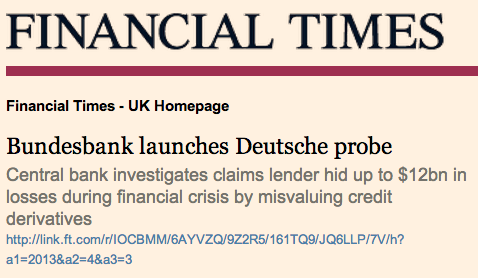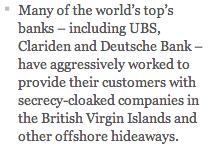The Guardian business web site tells us a lot about banking this morning:
So, Barclays were bastards, RBS were allegedly conmen, HBOS were incompetent and Lloyds were mugs.
And it's not just here. As the FT notes:
So Deutsche are hiding the truth.
Oh, and then add the International Consortium of Investigative Journalists:
So, we've now reached the stage in the national media where we can criticise banks.
But so far we're a long way from solutions. The banks still have the upper hand there. So far the media and politicians remain in awe of banks and ignore people like me, and many others, who have suggested what needs to be done.
I wonder how long it is before they'll listen?
Thanks for reading this post.
You can share this post on social media of your choice by clicking these icons:
You can subscribe to this blog's daily email here.
And if you would like to support this blog you can, here:






When the revolving door is closed.
A very good point Richard. The trouble is, when the last government bailed out the banks, they effectively let them get away with murder, and there’s no hope that this pack of right wing clowns we now have even have the will to attack or tackle the fecklessness, greed and crimes of the wealthy.
Putting the boot into the poor on the other hand…….
New Labour should either have let the banks go bust, if they weren’t ‘too important to fail’, or nationalised them and cleaned out the bankers if they were.
You are correct – the current setup is due to both Parties. The banks should have been allowed to go under – even taking into account the massive disruption that might have caused. That is the only conclusion you can draw from the seemingly endless series of fiascoes and farragoes that have characterised the sector in the last four years….
Utterly absurd
Why do to wish for complete and utter economic and social failure?
@ Van_Patten – Quite correct. Anyone saying otherwise is nothing more than an apologist/shill for the status quo….
Or should that be, statist quo?
With the correction, definitely not
I think it undoubtedly would have caused serious problems – but I’d argue the alternative that was taken, which is to allow an unregenerate Financial Sector simply to return to ‘Business as Usual’ has hardly been a roaring success either – however, I agree,the original entry should have been revised to ‘That is one conclusion’ not ‘That is the only’ – the other alternative was to take them into State ownership or increase the level of state control… Thanks for pointing out the need for clarification there!
I’d buy the alternative
I thought you would – I think we can agree ‘Business as Usual’ – which is what has happened here is undesirable. I don’t know how easy bringing these institutions under state control would be, legally or financially, which is why I’d have allowed them to fail and then picked up the pieces afterwards. You are right in that that would have been a calamity but it would have reformed the sector. Can you imagine anyone paying out any bonuses at all in the wake of that? Albeit, as a caveat, I am acutely aware that is at massive cost to society which would have been borne by those at the lower end of the economic scale, so it’s very far from being an ideal solution, nor even an especially good one – possibly the lesser of two evils vs keeping things ‘as is’. I would agree that is you could bring them under state control and keep them operating that would be much preferable – two agreements in one day!
I advocated state control in September 2008
Has anyone looked at the link between political parties and the wider financial sector ( banks hedge funds auditors etc)?
Simon, as far as I’m aware, over 50% of the Tory party’s funds now come from hedge funds. So not exactly a surprise when they show no interest in cleaning up the financial sector, but prefer to engage in a campaign of demonisation of the poorest and least wealthy using tactics Goebbels would have approved of.
Create a national chain of municipal banks. Everyone withdraws their money from the high street criminal banks and puts their money into the new local banks. They create money into their local communities. They also create local currencies a la Bristol Pound and switch the newly created monies into that local currency so it isn’t hived off into tax havens via the likes of (spits) Tesco. Give the finger to the capering buffoons at Westminster. Advise them that they and their banking sponsors can go fish. When said buffoons threaten that the banks will bring about the end of the national economy if they aren’t given their way, point out the new municipal banking network and invite them again to go fish. Rinse, repeat. Was there anything else?
The solution is new competitor banks to take the space. Why has this not happened? If the old encumbered banks cant lend because of higher capital requirements then why not positively encourage and allow new entrants (public,mutual & private) and the existing medium banks with QE grants.
This would mitigate the claim of existing banks inability to lend and allow business a choice if they decide to shrink lending in favour of other priorities.(Pay, bonus & dividends).
Systemically important banks should have a state imposed director with direct responsibility to the Bank of England.The compliance functions should report to that director.
Don’t forget to keep checking out Rowans blog which took my breath away recently.
http://rowans-blog.blogspot.co.uk/2013/03/why-british-banking-industry-has-become_27.html
You have to wonder! why this guy is not on the inside fixing the mess, instead of the outside.
Good stuff
Given the slamming the three HBOS executives have just got from the Parliamentary commission on banking standards, maybe, just maybe, those responsible for the financial crash are going to be brought to book.
The fact that this report says that they would have brought about the bank’s collapse even if the rest of the banking sector wasn’t going to collapse is really damning.
Their incompetence is superhuman! What more proof do you need of the need for a state bank, if this is the quality of private sector management in the financial sector?
Indeed. Often the argument against state-run banks is that the state can’t run a bank. On this evidence, neither can the private sector either.
What also annoys me, besides all of the fall-out that these banksters unleashed on society is:- Why has no CEO been charged with a crime and doing time for same? I know the answer and I guess you do also.
Because no crimes have taken place?
Candidly, I don’t believe you
What about money laundering at HSBC?
That’s implausible
Trading a bank whilst insolvent can be criminal
I would suggest the money laundering committed by HSBC has had no impact on society (which is what Mel referred to). The Mexican drug trade (and the global drug trade) will not be reduced by changes to banking activities.
I presume Mel was referring to the antics of bankers with regard to the financial crisis. HBOS senior management were obviously incompetent but not criminal.
If you can think that then you’re really quite extraordinarily beyond the pale
Please do not bother to comment again
The banks still laugh in our faces. After the last of the Barclay’s scam revelations it was only a matter of weeks before they were bragging that hardly anyone had moved their accounts. You see, people won’t put themselves on the line for change. Maybe if the banks had been allowed to collapse ( for once I agreed with some Republicans here!) maybe it would have been an unforgettable lesson for us. However, I’m a galbraithian cynic here: ‘A constant in the history of money is that every remedy is reliably a source of new abuse.’
I’m not sure whether HSBC count as a British bank any longer but their activities seemed to have slipped below the horizon here what with money laundering and conniving at sanctions busting. In the USA, there has been much reporting on this bank and indeed a congressional committee singled them out as criminal. Perhaps compared to Barclays they are just innocent as the day is long?
What with a billion or so of fines as evidence otherwise